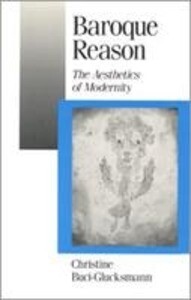
Zustellung: Sa, 30.11. - Fr, 06.12.
Versand in 3-4 Wochen
VersandkostenfreiBestellen & in Filiale abholen:
In this fascinating book, Christine Buci-Glucksmann explores the condition of modernity - alienation, melancholy, nostalgia - through the works of a number of writers and philosophers, including the social and aesthetic philosophy of Walter Benjamin.
The author examines Baudelaire's haunting image of the city and its profound effect on conceptions of modernity. She goes on to consider how such influential figures as Nietzsche, Adorno, Musil, Barthes and Lacan constitute a baroque paradigm, united by their allegorical style, their conflation of aesthetics with ethics and their subject matter - death, catastrophe, sexuality, myth, the female. In her exegesis of these fundamental themes Buci-Glucksmann proposes an epistemology beyond postmodernism.
This extraordinary exposition of a baroque reason for modernity sheds new light on a number of themes central to modern social theory.
The author examines Baudelaire's haunting image of the city and its profound effect on conceptions of modernity. She goes on to consider how such influential figures as Nietzsche, Adorno, Musil, Barthes and Lacan constitute a baroque paradigm, united by their allegorical style, their conflation of aesthetics with ethics and their subject matter - death, catastrophe, sexuality, myth, the female. In her exegesis of these fundamental themes Buci-Glucksmann proposes an epistemology beyond postmodernism.
This extraordinary exposition of a baroque reason for modernity sheds new light on a number of themes central to modern social theory.
Inhaltsverzeichnis
Introduction - Bryan S Turner
PART ONE: AN ARCHAEOLOGY OF MODERNITY: ANGELUS NOVUS
Angelic Space
Angelus Novus, an Overwhelming Picture
Baroque Space
Trauerspiel: Allegory as Origin
Baudelairean Space
A Modern Baroque
The Space of Writing
The Angel and the Scene of Writing: In the `Primeval Forest (Urwald)
PART TWO: THE UTOPIA OF THE FEMININE: BENJAMIN S TRAJECTORY 2
Catastrophist Utopia
The Feminine as Allegory of Modernity
Anthropological Utopia, or The Heroines of Modernity
Transgressive Utopia
Image Frontiers of Writing and History
Appendix
Viennese Figures of Otherness: Femininity and Jewishness
PART THREE: BAROQUE REASON
An Aesthetics of Otherness
Salome or, The Baroque Scenography of Desire
The Stage of the Modern and the Look of Medusa
PART ONE: AN ARCHAEOLOGY OF MODERNITY: ANGELUS NOVUS
Angelic Space
Angelus Novus, an Overwhelming Picture
Baroque Space
Trauerspiel: Allegory as Origin
Baudelairean Space
A Modern Baroque
The Space of Writing
The Angel and the Scene of Writing: In the `Primeval Forest (Urwald)
PART TWO: THE UTOPIA OF THE FEMININE: BENJAMIN S TRAJECTORY 2
Catastrophist Utopia
The Feminine as Allegory of Modernity
Anthropological Utopia, or The Heroines of Modernity
Transgressive Utopia
Image Frontiers of Writing and History
Appendix
Viennese Figures of Otherness: Femininity and Jewishness
PART THREE: BAROQUE REASON
An Aesthetics of Otherness
Salome or, The Baroque Scenography of Desire
The Stage of the Modern and the Look of Medusa
Produktdetails
Erscheinungsdatum
07. März 1994
Sprache
englisch
Seitenanzahl
192
Autor/Autorin
Christine Buci-Glucksmann
Verlag/Hersteller
Produktart
gebunden
Gewicht
680 g
ISBN
9780803989757
Entdecken Sie mehr
Bewertungen
0 Bewertungen
Es wurden noch keine Bewertungen abgegeben. Schreiben Sie die erste Bewertung zu "Baroque Reason" und helfen Sie damit anderen bei der Kaufentscheidung.









